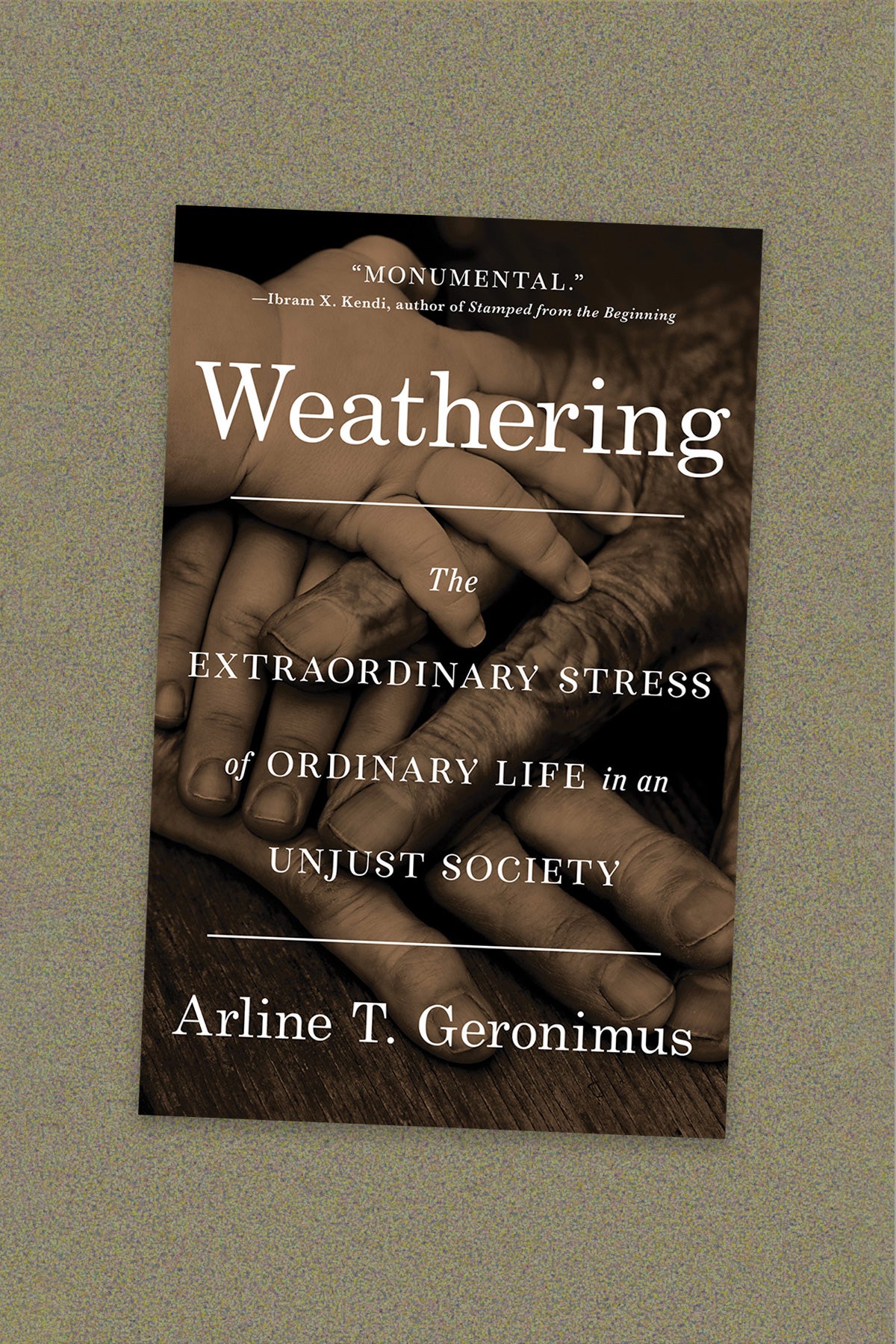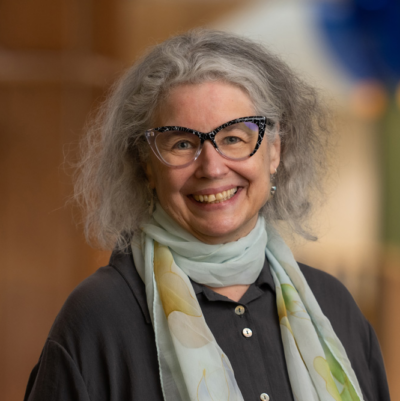
Book
The false narrative of coping with toxic stress
Decades ago, Arline Geronimus coined the term “weathering” to describe the physical toll that the stresses of social injustice take on marginalized populations. Harvard Public Health spoke to her in 2019 about the concept. In this excerpt from her book, Weathering: The Extraordinary Stress of Ordinary Life in an Unjust Society, Geronimus explores health challenges created by such stress.
In elite academic circles, the big scientific question is: What are the biological limits of that period when all keeps going well? Eighty‑five, 95, 100, 142? Not nearly enough attention is being paid to why, for certain marginalized groups, there is no such extended period of well‑being. How do we reconcile the notion that modern Americans have the potential to be healthy and vigorous well through middle and even old age with the stark evidence that many young and middle‑aged Black, brown, Native American, working‑class and poor white urban and rural Americans are not? How can we explain the rapid health decline of Black Americans and Appalachian whites which, according to a large body of research, including mine, begins in their twenties? Is there anything other than the age‑washed answer?
We have been inoculated from wrestling with these facts by the easy—but incomplete and wrongheaded—jump we make to individual behavioral explanations. This is the dark side of age‑washing. It tells us that if we are each biologically capable of living a long, healthy life, then it must be something we do or don’t do that leads some of us to have shorter and less healthy life spans.
Sign up for Harvard Public Health
Delivered to your inbox weekly.
Through an age‑washed filter, we have come to believe that population differences in health and longevity will disappear if we each become educated and affluent enough to be able to put into practice the steps one must take to sustain a healthy lifestyle. We assume (insofar as we are aware of the difference at all) that because members of marginalized groups are more likely to suffer chronic disease and cancers during their prime years, they must be eating too much sugar, salt, fat, and processed food, while exercising or sleeping too little. Full stop.
We also tend to cordon off each specific disease for which there is a health disparity—hypertension, diabetes, cancer—as separate from the others, although they are often trees that are part of the larger forest. We think these diseases stem from having an unfortunate genetic predisposition. Or they are the result of making behavioral missteps in the realm of diet, exercise, or alcohol and drug abuse. Some people frame those missteps as the avoidable product of ignorance, sloth, or gluttony. Others, of a less accusatory mindset, see them as systemically imposed: the product of impoverishment, of overwork for inadequate pay, of being redlined into neighborhoods without access to healthy food, good schools, reliable transportation, and good jobs outside the drug economy. Applied to COVID‑19 inequities, we can hermetically seal our age‑washed bubble if we tie infectious‑disease death disparities to the greater likelihood that Black and brown people suffer from the preexisting chronic conditions found to be statistically associated with a poor COVID‑19 prognosis—like obesity, diabetes, cardiovascular disease, or respiratory disease. Each of these conditions is associated with specific unhealthy behaviors. But all these individual or disease‑specific explanations can go only so far, and they fail to take into account the physiological processes that contribute to weathering, which increase health vulnerability throughout the body. Weathering might manifest as obesity, hypertension, diabetes, respiratory disease, or other chronic diseases of aging, but people who are weathered suffer stress‑mediated wear and tear across their body systems long before they can be diagnosed with specific diseases or conditions. Focusing on the individual, these explanations also fail to grasp the systemic social forces that set the damaging physiological processes in motion.
Health is not an immutable consequence of one’s genetic code, nor a reflection of one’s character. Living life according to the dominant social norms of personal responsibility and virtue is not universally health‑promoting. On the contrary: if you’re Black, working hard and playing by the rules can be part of what kills you. For the Black community, such virtue is a cause of death that dates back centuries, because the stress of navigating presumptions based on stereotypes, all while working hard and keeping a low profile, has been killing Black Americans since the time of slavery and continues to do so in the twenty‑first century. At a church in Harlem in 1964, civil rights activist Fannie Lou Hamer famously said that she was “sick and tired of being sick and tired.” These words resonate with many Black Americans to this day, because they describe a very real phenomenon, physiologically as well as existentially. The repeated or chronic activation of stress processes over years and decades—the measurable physiological stress you feel in the body—has both immediate and long‑lasting consequences for physical health and longevity. In short, it can make you sick or disabled or even kill you.
The cascade of physiological processes that lead to heart disease, cancer, and other diseases associated with aging can be triggered every day in any of us, no matter our DNA signature, no matter whether we eat sugary, fatty processed foods from plastic containers while we smoke and watch TV on the couch, no matter whether we suffer genetic mutations from chemicals at our workplaces or pathogens in our air, water, and soil. Yes, we would be better off if, as individuals, we won the 23andMe lottery, if we didn’t face toxic exposures or engage in those unhealthy behaviors. But none of these are the be‑all and end‑all of health inequity, or even its primary driver.
In contrast to what the age‑washing narrative tells us, it is not a forgone conclusion that we can avoid disability and postpone death by following socially approved health protocols, having a college degree, or enjoying a stable income well above the poverty level. Depending on their lived experiences, relatively young people can be biologically old. That’s why some population groups disproportionately suffer early onset of the diseases of aging—and even early death. This will continue to be the case no matter what they eat, how much they exercise, the size of their paycheck, or where they live or work, unless something changes in the society around them.
To understand how these accelerated‑aging processes work, and to counter the prevailing belief that living to an advanced old age is more or less accessible to each according to his lifestyle, I have been exploring the process of weathering ever since I first posited it, decades ago. The disproportionate death toll of the COVID‑19 pandemic on the poor, the working class, and people of color across classes lays bare the fact that weathered bodies are more vulnerable to the worst ravages of infectious disease outbreaks. Weathering has left them with dysregulated or exhausted immune systems, which makes them unable to mount proper immune responses and predisposes them to the dreaded cytokine storms that are often the immediate cause of COVID‑19 related death. In general, it has been individuals aged sixty‑five and up who are at highest risk of dying from COVID‑19, but we fail to acknowledge that the effects of weathering have rendered certain populations biologically older than their chronological age, putting them at higher risk of severe chronic or infectious disease and death than would be predicted by their chronological age alone.
Copyright © 2023 by Arline T. Geronimus. Text and cover reprinted with permission of Hachette Book Group / Little Brown. All rights reserved.



